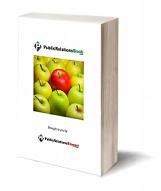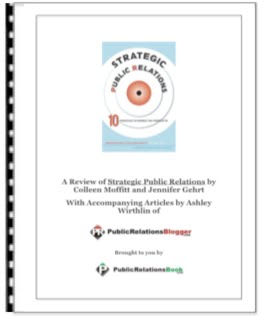________________________________________________________________________
Everyone is talking about the Ps of successful marketing, so I thought it was time that PR had it's own Ps - essentials that will help you maximise your PR activities and results.
1. Pin-point
The first thing you have to do in a campaign is to pin-point your market. There's no point pulling out all the stops to get into the Financial Times when your customers are actually more likely to read The Sun. In fact failing to pin-point your market and consequently the publications it reads can actually make every single action you put into your PR after that point absolutely worthless. It may seem boring to spend time on market research, especially if you're keen to get going, but it's a vital part of the process.
2. Publications.
When you find the publications that your potential customers read (as well the radio programmes they listen to, the TV programmes they watch and the websites they visit) immerse yourself in them. Subscribe to them, read them on the train, in the bath, teach your kids to read with them. Get to know the language of the different publications, the focus, and who writes what.
3. Power.
Think about your message. If you're going to go to all the bother of putting a press release together it had better be powerful.
4. Passion.
One of the simplest ways to access power is to tap into your passion. Imagine reading your release out loud - is it vibrant, full of passion for the subject matter and compelling the listener to keep tuned in, or is it dull and monotonous with no impact whatsoever?
5. Pliable.
Your campaign has to be flexible, ready to respond to national or trade news. You need to be flexible, ready to break your routine and set aside a morning to make some calls if you suddenly come up with an idea that might get the press interested.
6. Poise.
Do try to retain some dignity. Journalists work to strict deadlines and conditions and if one of them says "sorry, it's not for us" then do respect them and don't start trying to convince them to change their mind. What you can do however is to ask them what is, and learn for the future.
7. Playful.
A sense of humour is vital..no client does better than the one that can crack a good joke or make a suitably humorous remark at the right moment. Even a bit of gentle flirting can sometimes work wonders!
8. Paper.
Don't forget that you don't always have to email. If you've got something visual, or particularly nice stationery (!) then do use the post. It's more expensive of course, but it will help you to stand out.
9. People.
Journalists and editors and people, just like you and me. Some you'll like and some you'll dislike, but it's important to treat them respectfully. Just like you rarely make a new friend over the process of one telephone call, it will take time to build up bonds and those all important "contacts".
10. Persistence.
I believe that this is the single most important factor when it comes to making your campaign a success. It can take months for a campaign to really get going and one press release alone just won't do it. Journalists need to see that you're hear to stay, a provider of professional material and a brand to be reckoned with. Be patient, it will happen.
Paula Gardner teaches businesses of all sizes how to raise their media profile. If you'd like the whys, hows and what to do's of a PR campaign at your fingertips then check out our PR ecourse here.
Article Source.
Tags: professional public relations, public relations tips, public relations
|

Ten P's for Professional Public Relations
________________________________________
Everyone is talking about the Ps of successful marketing, so I thought it was time that PR had it's own Ps - essentials that will help you maximise your PR activities and results.1. Pin-point
The first thing you have to do in a campaign is to pin-point your market. There's no point pulling out all the stops to get into the Financial Times when your customers are actually more likely to read The Sun. In fact failing to pin-point your market and consequently the publications it reads can actually make every single action you put into your PR after that point absolutely worthless. It may seem boring to spend time on market research, especially if you're keen to get going, but it's a vital part of the process.
2. Publications.
When you find the publications that your potential customers read (as well the radio programmes they listen to, the TV programmes they watch and the websites they visit) immerse yourself in them. Subscribe to them, read them on the train, in the bath, teach your kids to read with them. Get to know the language of the different publications, the focus, and who writes what.
3. Power.
Think about your message. If you're going to go to all the bother of putting a press release together it had better be powerful.
4. Passion.
One of the simplest ways to access power is to tap into your passion. Imagine reading your release out loud - is it vibrant, full of passion for the subject matter and compelling the listener to keep tuned in, or is it dull and monotonous with no impact whatsoever?
5. Pliable.
Your campaign has to be flexible, ready to respond to national or trade news. You need to be flexible, ready to break your routine and set aside a morning to make some calls if you suddenly come up with an idea that might get the press interested.
6. Poise.
Do try to retain some dignity. Journalists work to strict deadlines and conditions and if one of them says "sorry, it's not for us" then do respect them and don't start trying to convince them to change their mind. What you can do however is to ask them what is, and learn for the future.
7. Playful.
A sense of humour is vital..no client does better than the one that can crack a good joke or make a suitably humorous remark at the right moment. Even a bit of gentle flirting can sometimes work wonders!
8. Paper.
Don't forget that you don't always have to email. If you've got something visual, or particularly nice stationery (!) then do use the post. It's more expensive of course, but it will help you to stand out.
9. People.
Journalists and editors and people, just like you and me. Some you'll like and some you'll dislike, but it's important to treat them respectfully. Just like you rarely make a new friend over the process of one telephone call, it will take time to build up bonds and those all important "contacts".
10. Persistence.
I believe that this is the single most important factor when it comes to making your campaign a success. It can take months for a campaign to really get going and one press release alone just won't do it. Journalists need to see that you're hear to stay, a provider of professional material and a brand to be reckoned with. Be patient, it will happen.
Paula Gardner teaches businesses of all sizes how to raise their media profile. If you'd like the whys, hows and what to do's of a PR campaign at your fingertips then check out our PR ecourse here.
Article Source.
Tags: professional public relations, public relations tips, public relations
Popular choices
- Non Gamstop Casino
- Mejores Salas De Póker
- Casino Non Aams
- Non Gamstop Casinos
- Siti Casino Online Non Aams
- Migliori Siti Casino Online
- UK Online Casinos Not On Gamstop
- Meilleur Casino En Ligne Live
- Non Gamstop Casino Sites UK
- Non Gamstop Casino Sites UK
- UK Casino Not On Gamstop
- Casinos Not On Gamstop
- Online Casino
- オンラインカジノ
- UK Casino Not On Gamstop
- UK Casino Not On Gamstop
- Reputable Non Gamstop Casinos
- Casinos Not On Gamstop
- Best Non Gamstop Casinos
- Non Gamstop Casino
- Casinos Not On Gamstop
- Slots Not On Gamstop
- Non Gamstop Casino
- Casino Non Aams
- Casinos Not On Gamstop
- Betting Sites Not On Gamstop
- Casino Online Italia
- Casino En Ligne
- Casino En Ligne Belgique
- Siti Scommesse Bitcoin
- KYC 인증 없는 카지노
- Sites De Paris Sportif Fiables
- Casino En Ligne France
- Casino Non Aams Prelievo Immediato
- Meilleur Casino En Ligne Belgique
- Meilleur Casino En Ligne 2026
- Meilleur Casino En Ligne
- Casino En Ligne 2026
- Casino En Ligne France
|
| What did you think? |
Filed Under:
professional public relations,
public relations,
public relations tips
Subscribe to:
Post Comments (Atom)






Comments (0)
Post a Comment